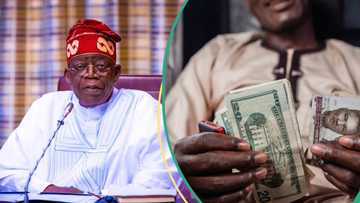Fitch Expects Nigerian Banks to Record More Bad Loans, Assigns Ratings for GTB, Access, UBA, Others
- A credit rating agency has said Nigerian banks will see an increase in bad loan records due to the recent naira depreciation
- It stated that the latest devaluation led to the convergence of the official exchange rate with the parallel market rate
- It also stated that Nigerian banks had the qualities that would allow them to sustain a solid commercial outlook
PAY ATTENTION: The 2024 Business Leaders Awards Present Entrepreneurs that Change Nigeria for the Better. Check out their Stories!
Legit.ng journalist Zainab Iwayemi has over three years of experience covering the Economy, Technology, and Capital Market.
Fitch Ratings has predicted a faster increase in bad loans in Nigerian banks because of the recent depreciation of the naira.

Source: UGC
The global rating agency made this known in a statement citing that the Nigerian naira was recently devalued sharply, exceeding its expectations of a more moderate depreciation in 2024.
It stated that the large devaluation is the second within a year (70% devaluation since end-2022) and has converged the official exchange rate with the parallel market rate.
PAY ATTENTION: Share your outstanding story with our editors! Please reach us through info@corp.legit.ng!
It therefore stated that the continued move away from a longstanding managed exchange rate regime is conducive to restoring capital inflows and reducing foreign-currency (FC) shortages that have weighed on economic activity in recent years.
It added:
“However, it creates short-term macroeconomic risks, such as accentuating already-high inflation (December 2023: 29% yoy) that may weigh on economic growth, heightening loan quality and capital pressures already facing the banking sector.
“Fitch now expects the banking sector’s impaired loans (Stage 3 loans) ratio to increase at a faster pace than before the devaluation, which itself has caused already material FC-denominated problem loans (Stage 2 and Stage 3 loans; predominantly oil and gas sector loans) to have inflated relative to gross loans and core capital and accentuated credit concentration risks.”

Read also
"Nigerians no longer able to buy beer": NB CEO speaks after release of new price list for drinks
Fitch rates Nigerian banks stable
Fitch Ratings confirmed that several Nigerian banks had inherent qualities that would allow them to sustain a solid commercial outlook.
It stated that many Nigerian banks, including the biggest ones, have enough reserves to withstand macroeconomic headwinds.
Fitch maintained the banks' 'B-' Long-Term IDR and National Long-Term Ratings with Stable outlook ratings.
The banks are:
- Access Bank Plc; Zenith Bank Plc;
- United Bank for Africa (UBA) Plc;
- Jaiz Bank Plc;
- Guaranty Trust Holding Company Plc (GTCO) and its flagship Guaranty Trust Bank Limited (GTB);
- FBN Holdings Plc and its flagship subsidiary, First Bank of Nigeria Ltd;
- Fidelity Bank Plc
- Wema Bank Plc.
Additionally, Fitch Ratings maintained the National Long-Term Ratings of "AAA (nga)" with a Stable Outlook for Stanbic IBTC Holdings Plc and its principal subsidiary, Stanbic IBTC Bank Plc.
However, Fitch Ratings kept the National Long-Term Ratings of "BBB(nga)" and "BBB+(nga)" for First City Monument Bank (FCMB) and Union Bank of Nigeria PLC (UBN) at Rating Watch Negative (RWN).

Read also
CBN governor, Cardoso, confirms Nigeria witnessed $1.8bn FX inflow as FG secures $30bn investment
The global rating agency downgraded Ecobank Nigeria Limited's (ENG) Long-Term Issuer Default Rating (IDR) to 'CCC+' from 'B-' and removed it from RWN, citing the recent devaluation of the Nigerian naira.
Fitch also downgraded the bank's National Long-Term Rating to 'BB+(nga)' from 'BBB (nga)'. The Outlook on the Long-Term IDR and National Long-Term Rating is Stable.
Citing the recent devaluation of the Nigerian currency, the global rating agency downgraded Ecobank Nigeria Limited's (ENG) Long-Term Issuer Default Rating (IDR) from "B-" to "CCC+" and removed it from RWN. Additionally, the bank's National Long-Term Rating was reduced by Fitch from "BBB (nga)" to "BB+(nga)." Both the National Long-Term Rating and the Long-Term IDR Have a Stable Outlook.
Fitch speaks on forex
Legit.ng reported that Fitch stated that the Central Bank of Nigeria (CBN) does not have enough foreign exchange (Forex) to clear the country's demand backlog.

Read also
Exchange rate falls to lowest ever, hits N2060/£1, N1700/$1 as CBN orders banks, others to release FX
According to a Vanguard report, Gaimin Nonyane, the director of Middle East and Africa sovereigns at Fitch, said this in a webinar.
She also warned that the country's revenue ratio is a critical weakness in its sovereign credit rating.
PAY ATTENTION: Unlock the best of Legit.ng on Pinterest! Subscribe now and get your daily inspiration!
Source: Legit.ng



